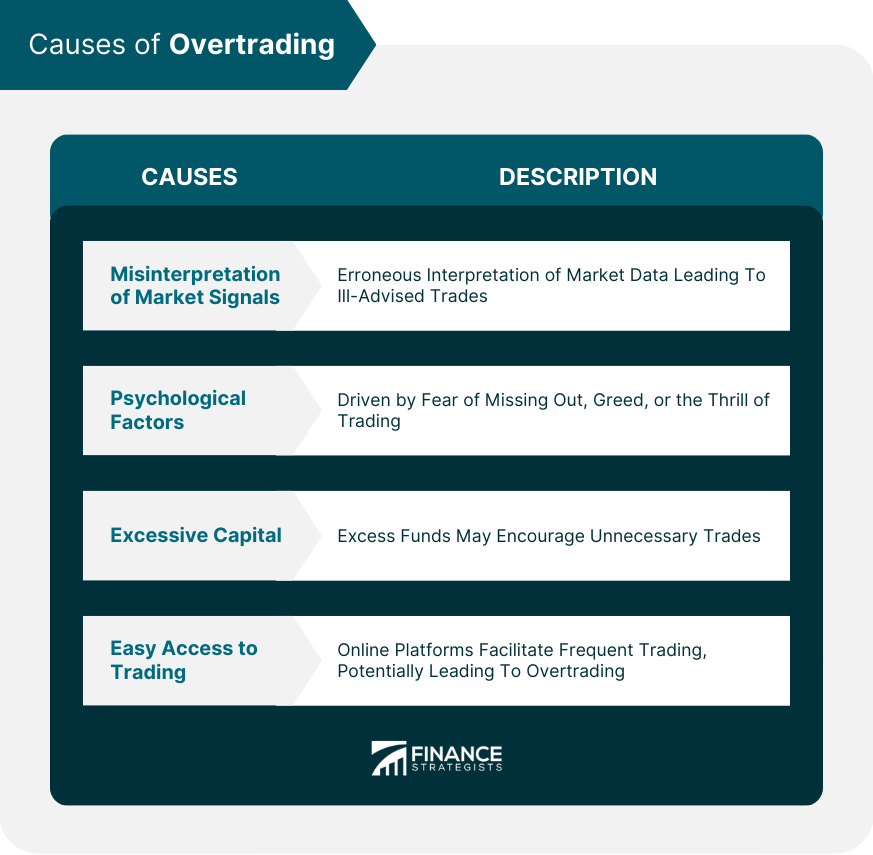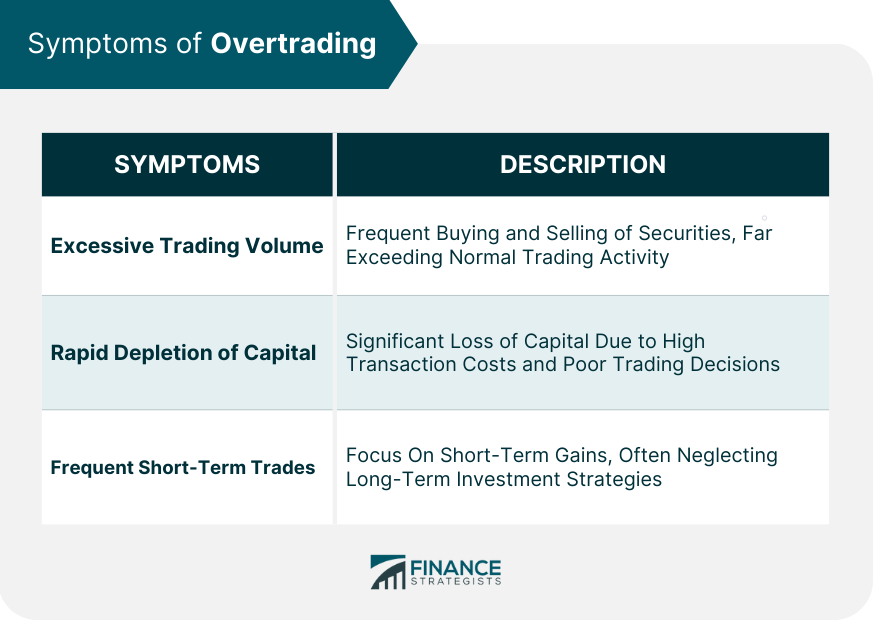Overtrading is an excessive trading activity that goes beyond an investor's financial capability or the market's optimal state. It is often triggered by a misinterpretation of market signals, psychological factors such as fear or greed, and easy access to trading platforms. The symptoms of Overtrading are excessive trading volume, rapid capital depletion, and a tendency for frequent short-term trades, often with disregard for long-term investment strategies. Beyond the individual investor, Overtrading has broader market implications. It can induce market volatility by causing drastic price fluctuations. It can lead to market inefficiencies, as constant buying and selling can distort true security values. Additionally, Overtrading can contribute to the formation and burst of financial bubbles, leading to severe market downturns. Thus, Overtrading is a risky behavior with significant personal and market-wide consequences. One of the main causes of Overtrading is the misinterpretation of market signals. Traders often misread market data, leading them to make trades based on perceived opportunities that may not actually exist. For instance, a sudden rise in a stock’s price might be seen as a buying opportunity, when in fact, the price might be peaking and about to decline. Overtrading can also be driven by psychological factors. Fear of missing out (FOMO) on lucrative deals, greed for higher returns, and the thrill of trading can push investors to trade excessively. The proliferation of online trading platforms has made it easier than ever for individuals to trade, often leading to Overtrading. Furthermore, having excessive capital can also lead to Overtrading as investors may feel the need to constantly invest their funds instead of strategically waiting for the right opportunity. Overtrading is often characterized by a high volume of trades. Investors who overtrade usually make multiple trades per day, far exceeding their usual trading activity. A clear symptom of Overtrading is the rapid depletion of capital. Excessive trading incurs substantial transaction costs, which eat into the trader's capital over time. Overtraders tend to focus on short-term trades, hoping to make quick profits. They often ignore long-term investment strategies, which can lead to unstable financial results. Overtrading can lead to significant financial losses. High transaction costs, poor trade decisions, and the impact of market volatility can rapidly deplete an investor's capital. Overtrading can also have severe emotional and psychological effects. The stress of constant trading, coupled with financial losses, can lead to anxiety, depression, and other mental health issues. The thrill of trading, especially when occasionally it leads to substantial gains, can become addictive. This addiction can further fuel Overtrading, creating a vicious cycle that is hard to break. Overtrading can contribute to market volatility. Excessive buying and selling of securities can cause drastic fluctuations in their prices, leading to an unstable market. Overtrading can lead to market inefficiency. When securities are frequently bought and sold, their prices may not accurately reflect their true value, leading to market distortions. Overtrading can also contribute to the formation of financial bubbles. When traders overbuy certain securities, their prices can inflate far beyond their intrinsic values, creating a bubble that can burst and lead to a market crash. Preventing Overtrading starts with developing a disciplined trading strategy. This involves setting clear trading goals, defining risk tolerance levels, and sticking to a well-planned trading schedule. Education is key to preventing Overtrading. Investors need to understand the risks associated with Overtrading and learn to recognize the signs of excessive trading. Using stop loss and limit orders can help control the urge to overtrade. These tools allow traders to set predefined levels at which they will sell security, helping to manage risk and prevent impulsive trading decisions. Regulatory bodies like the Securities and Exchange Commission (SEC) and the Financial Industry Regulatory Authority (FINRA) have measures in place to curb Overtrading. These include rules regarding pattern day trading, margin requirements, and capital adequacy rules for broker-dealers. Given the increase in retail trading and the potential risks of Overtrading, regulators may consider introducing further measures. These could include stricter rules for high-frequency trading, better investor education, and tighter regulations for online trading platforms. While regulatory measures are crucial for maintaining market stability, they are not without controversy. Some critics argue that these rules can limit market liquidity and hinder the growth of the financial market. Balancing the need for regulation with the benefits of a free market is an ongoing challenge. There are numerous examples of individual investors who suffered significant losses due to Overtrading. For instance, during the dot-com bubble, many retail investors lost their life savings as they got caught up in the frenzy of buying tech stocks. Despite the risks, some traders have managed to recover from Overtrading. By adopting a disciplined trading strategy, seeking professional advice, and focusing on long-term investment goals, they have been able to rebuild their financial portfolios. These case studies highlight the importance of disciplined trading, proper risk management, and continuous financial education. They serve as a reminder of the potential pitfalls of Overtrading and the importance of a balanced approach to investing. Overtrading is a complex financial phenomenon with deep-seated causes, identifiable symptoms, and far-reaching effects. It often stems from a misinterpretation of market signals, psychological factors such as fear and greed, and the ease of access to trading platforms. Overtraders exhibit symptoms like excessive trading volumes, rapid depletion of capital, and a focus on frequent short-term trades. Beyond individual consequences, Overtrading has a significant impact on the broader financial market. It can increase market volatility, create inefficiencies, and even contribute to the formation of financial bubbles that can lead to market crashes. Understanding these aspects of Overtrading is critical for both individual investors and market regulators to promote healthier and more sustainable trading practices. The risks posed by Overtrading reinforce the importance of disciplined trading, financial literacy, and effective regulation.Definition of Overtrading
Causes of Overtrading

Misinterpretation of Market Signals
Psychological Factors
Excessive Capital and Easy Access to Trading
Symptoms of Overtrading

Excessive Trading Volume
Rapid Depletion of Capital
Frequent Short-Term Trades
Impact of Overtrading on Individual Investors
Financial Implications
Emotional and Psychological Effects
Potential for Addiction to Trading
Impact of Overtrading on the Financial Market
Market Volatility
Market Inefficiency
Risk of Financial Bubbles
Measures to Prevent Overtrading
Developing a Disciplined Trading Strategy
Educating Oneself about the Risks of Overtrading
Utilizing Stop Loss and Limit Orders
Role of Regulatory Bodies in Curbing Overtrading
Current Regulatory Measures Against Overtrading
Possible Future Regulations to Prevent Overtrading
Criticism and Controversy Around Regulatory Measures
Individual Investors Who Suffered from Overtrading
Successful Recovery From Overtrading
Lessons Learned from These Case Studies
Conclusion
Overtrading FAQs
Overtrading refers to the practice of conducting an excessive amount of trades that surpasses an investor's financial capacity or the optimal trading volume for a specific market situation.
Overtrading is often caused by misinterpretation of market signals, psychological factors such as fear and greed, and the ease of access to trading platforms.
The symptoms of Overtrading include excessive trading volume, rapid depletion of capital, and a propensity for frequent short-term trades.
Overtrading can lead to increased market volatility, market inefficiencies, and the formation of financial bubbles, which can result in severe market downturns.
Overtrading can be prevented by developing a disciplined trading strategy, educating oneself about the risks associated with Overtrading, and using trading tools such as stop loss and limit orders to manage risk.
True Tamplin is a published author, public speaker, CEO of UpDigital, and founder of Finance Strategists.
True is a Certified Educator in Personal Finance (CEPF®), author of The Handy Financial Ratios Guide, a member of the Society for Advancing Business Editing and Writing, contributes to his financial education site, Finance Strategists, and has spoken to various financial communities such as the CFA Institute, as well as university students like his Alma mater, Biola University, where he received a bachelor of science in business and data analytics.
To learn more about True, visit his personal website or view his author profiles on Amazon, Nasdaq and Forbes.















